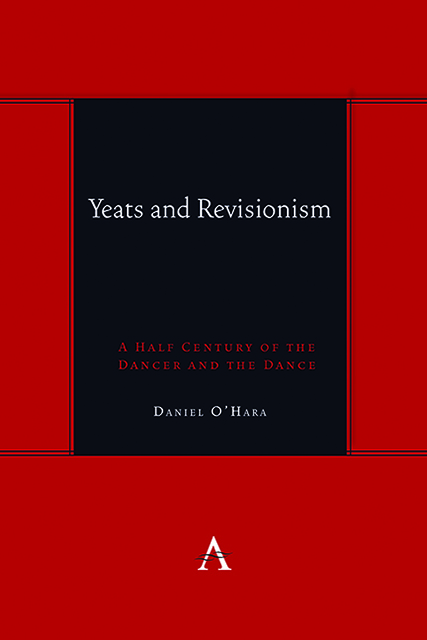Book contents
- Frontmatter
- Dedication
- Contents
- Acknowledgments
- Preface
- Introduction: Dancer and Dance: Yeats’s Romantic Modernism and Critical Revisionism
- Chapter 1 The Irony of Tradition in W.B. Yeats’s Autobiography: Dialectical Hermeneutics Beyond the New Criticism
- Chapter 2 The Specialty of Self-Victimization: On Antithetical Revisionism
- Chapter 3 Yeats in Theory: Blackmur, Bloom, De Man and Hartman
- Chapter 4 The Divisions of Yeats Studies Continued
- Chapter 5 Modernism’s Global Identity: on the Dogmatic Imagination in Yeats, Freud and Beyond
- Chapter 6 Yeats With Lacan: Toward the Real Modernism
- Chapter 7 The Spirit Medium: Yeats, Quantum Visions and Recent Lacanian Studies
- Chapter 8 And All the Ceremonies to Come: Of High Modernism, Visionary Violence and Post-Marxism
- Afterword: The Reader in Yeats
- Bibliography
- Index
Chapter 1 - The Irony of Tradition in W.B. Yeats’s Autobiography: Dialectical Hermeneutics Beyond the New Criticism
Published online by Cambridge University Press: 08 June 2023
- Frontmatter
- Dedication
- Contents
- Acknowledgments
- Preface
- Introduction: Dancer and Dance: Yeats’s Romantic Modernism and Critical Revisionism
- Chapter 1 The Irony of Tradition in W.B. Yeats’s Autobiography: Dialectical Hermeneutics Beyond the New Criticism
- Chapter 2 The Specialty of Self-Victimization: On Antithetical Revisionism
- Chapter 3 Yeats in Theory: Blackmur, Bloom, De Man and Hartman
- Chapter 4 The Divisions of Yeats Studies Continued
- Chapter 5 Modernism’s Global Identity: on the Dogmatic Imagination in Yeats, Freud and Beyond
- Chapter 6 Yeats With Lacan: Toward the Real Modernism
- Chapter 7 The Spirit Medium: Yeats, Quantum Visions and Recent Lacanian Studies
- Chapter 8 And All the Ceremonies to Come: Of High Modernism, Visionary Violence and Post-Marxism
- Afterword: The Reader in Yeats
- Bibliography
- Index
Summary
I shall not try to construct a systematic answer to this question by starting with a dogmatic principle. Rather, I shall proceed by a series of approximations wherein the solution reached at one level will be rectified by bringing the initial question back into question.
—Ricoeur, History and Truth“The modern wit is the only representative of the old hero. Wit is never vanquished; and courage is an essential part of it.”
—Yeats, quoted in Lady Gregory's Seventy YearsEs gibt im Geistigen keine Vernichtung.
—Nietzsche, The Will to PowerModern poetic autobiography originated with the Romantics’ desire to overcome that growing fragmentation of human existence that had its most immediate sources in the revolutionary scientific and historical critiques that so indiscriminately leveled every traditional structure and value of the culture. Just as people in ages of faith once turned to the confessional genre to discover the specific providential plan secretly at work in the lives, so, during the nineteenth century especially, poets and prose writers such as Wordsworth, Mill and Carlyle, who increasingly found this option denied to them, resorted to the autobiographical mode to determine if perhaps some imaginative pattern of ultimate meaning—or of personal continuity at least, however baleful—could be discovered beneath the apparently random and contradictory details of their experiences.
In this context the figure of the autobiographer and the image of his work clearly become of central importance. The former emerges in the course of the figure of a man who, suffering from an identity crisis, can be seen as in desperate quest of his very self. His work as a result appears to be the place where he seeks not only to trace but hopefully to prefigure the entire journey, as the symbolic history of his own imaginative survival in a bad time: from the imagination's wondrous if hazardous birth, through its eccentric development and self-conscious passion, to its intermittent pangs of a spiritual rebirth.
Thus, the work's completed narrative form describes a dialectical “progress,” which paradoxically is also a spiraling back from the present beginnings in the identity crisis, through the return to the original sources or first principles of imaginative being, to the point where the figurative repetition of the life's wayward movement begins: with the onset of the identity crisis.
- Type
- Chapter
- Information
- Yeats and RevisionismA Half Century of the Dancer and the Dance, pp. 19 - 50Publisher: Anthem PressPrint publication year: 2022



